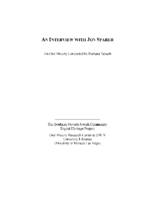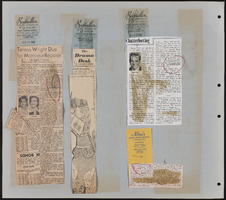Search the Special Collections and Archives Portal
Search Results

Transcript of interview with Jon Sparer by Barbara Tabach, March 4, 2015
Date
Archival Collection
Description
In this interview, Jon Sparer discusses his involvement as the architect of Congregation Ner Tamid's synagogue in Green Valley. He explains details of the building including the concrete tilt-up form, glass windows and the incorporation of quotes throughout the building. Sparer also discusses his involvement with the Gay and Lesbian Community Center of Southern Nevada (The Center) as a board member.
According to architect Jon Sparer, when he moved to Las Vegas in the early 1980s, the art of the deal was still based on a "handshake." It was just after the infamous MGM fire and Jon went to work for Rissman and Rissman. He later worked for Marnell Corrao Associates until 2001, and then as a principal in his own firm. He is now retired. While honing his design skills with the exciting transformation of the Strip into a world-class destination, Jon also became an active contributor to the Las Vegas community. Among his most notable experiences was being on the search committee for a new location for the fast growing Congregation Ner Tamid and then the architectural design for the synagogue's location in Henderson. It was a unique experience and Jon tells how he approached each aspect of the religious facility and how it would provide a memorable setting for life experiences. Jon has been involved with Jewish Family Services and the Anti-Defamation League (ADL). In addition, Jon along with his husband John Klai have been instrumental in the LGBTQ community and the opening of the Gay and Lesbian Community Center of Southern Nevada [The Center]. In this interview, he also talks about the significance of The Center/ and its success in working with the Clark County Health District, as well as providing a user-friendly experience for all who visit The Center and the Bronze Cafe located there.
Text
Kerin Scianna Rodgers oral history interview
Identifier
Abstract
Oral history interview with Kerin Scianna Rodgers conducted by Dennis McBride on February 24, 1998 for the Las Vegas Gay Archives Oral History Project. Rodgers discusses arriving in Las Vegas, Nevada and her background in the arts. She discusses her position as Special Assistant to the Governor and being appointed as a commissioner for the performing arts. Rodgers also discusses opening her bar, Gipsy.
Archival Collection
Tamara Pickett oral history interviews
Identifier
Abstract
Oral history interviews with Tamara Pickett conducted by Dennis McBride on November 01, 2002 and November 08, 2002 for the Las Vegas Gay Archives Oral History Project. In these interviews, Pickett discusses her early life and the traumatizing experiences that occurred during her childhood. Pickett remembers serving in the United States Army, beginning her transition to Tamara, and completing a sexual reassignment surgery in 1999. Later, Pickett talks about her activism work in Las Vegas, Nevada, campaigning for improved health care for transgender veterans, and her involvement with the transgender community in Las Vegas.
Archival Collection
Daniel Hinkley Papers
Identifier
Abstract
The Daniel Hinkley papers are comprised of material documenting Hinkley's work on behalf of the gay community in Las Vegas, Nevada between the years of 1991 to 2016. It includes Hinkley's files on the Progressive Leadership Alliance of Nevada, the campaign against Question 2, and various subjects related to the gay community in Las Vegas.
Archival Collection
Albert (Bert) Hood oral history interview
Identifier
Abstract
Oral history interview with Albert Hood conducted by Dennis McBride on June 16, 1998 for the Las Vegas Gay Archives Oral History Project. In this interview Bert Hood discusses his early life, getting married to a woman, joining the army, discovering his sexuality, and the various loves of his life. He also talks about coming to Las Vegas, Nevada in 1962, working at the Sands Hotel as a bartender, serving The Rat Pack, who tipped him generously, cruising at Squires Park, local gay landmarks, and the first drag shows in Las Vegas.
Archival Collection

Patricia Vazquez interview, November 14, 2018, June 14, 2019: transcript
Date
Archival Collection
Description
Session 1: Interviewed by Marcela Rodriguez-Campo. Barbara Tabach also participates in the questioning. Session 2: Interviewed by Rodrigo Vazquez. Monserrath Hernandez also participates in the questioning. Patricia Vazquez was born and raised in Las Vegas, NV and shares her experiences growing up in the Valley as a Queer Latina. At a young age, she remembers traveling back and forth between Mexico and the U.S. to visit family. When she started school she shares how her home language, Spanish, became her family's "secret language" as she began to learn English. During elementary school Patricia was tracked into the special education program, and remove from the mainstream classroom. She would find her love for learning in books and libraries as she taught herself how to read in English. Despite being tracked into less advanced courses, Patricia would end up taking AP/ Honors courses in high school after forging her favorite teachers signature, which changed her educational trajectory. After coming out to her family, Patricia went nearly a decade distanced from her mother and continued her college education at Arizona State University. There, she would complete a bachelors in painting and a masters in comparative literature. Her work with the Chicano Studies program at ASU helped her develop her Chicana identity and begin her involvement in social activism. In Las Vegas, she worked to fight for marriage equality and LGBTQ rights with the American Civil Liberties Union , and later with the Progressive Leadership Alliance of Nevada. She also conducted several lectures for the Latino Youth Leadership Conference on sexuality, gender, and homophobia for over a decade. She has served as an English Professor at the College of Southern Nevada for the last 20 years and is an avid hiker, traveler, and painter.
Text
Jerry Cade oral history interviews
Identifier
Abstract
Oral history interviews with Jerry Cade conducted by Dennis McBride on various dates in February, May, June, July, and November of 2003 for the Las Vegas Gay Archives Oral History Project. In these interviews, Cade recalls his early life in Kermit, Texas, his education, his Methodist upbringing, and understanding his sexuality during high school and college. He then talks about traveling to Spain in January 1976 where he met his first romantic partner. Cade then describes moving to Las Vegas, Nevada in 1981 to work at the Community Health Centers of Southern Nevada. He also discusses other relationships he had since moving to Las Vegas, his political activism, working on the first American Medical Association panel to study AIDS in 1983, and his first AIDS patient in August 29, 1985. Cade then elaborates on the history of AIDS in Las Vegas, AIDS support and advocacy groups in Las Vegas, the public perception of AIDS and the gay community, and the repeal of Nevada's sodomy law.
Archival Collection

